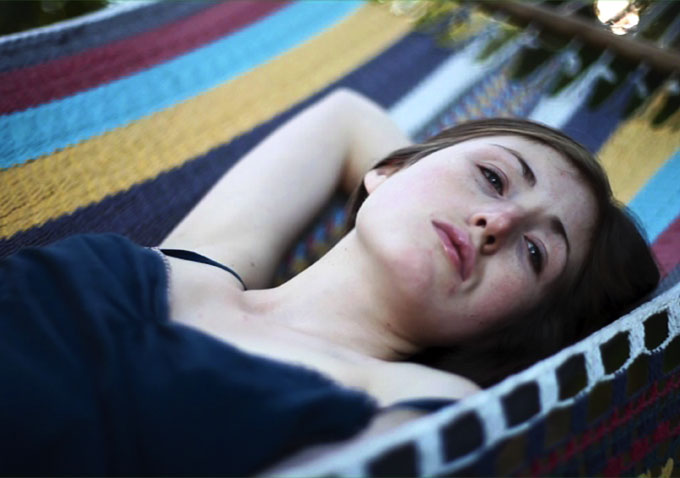 When you love someone, there exists an innate fear that they may find someone else. Someone mentally stronger, perhaps, or just more naturally kind. Or, in some cases, just different. What’s devastating is the change occurring within someone we thought we knew intimately. Is this the person we fell in love with? Is this the person who claims they know me better than anyone else?
When you love someone, there exists an innate fear that they may find someone else. Someone mentally stronger, perhaps, or just more naturally kind. Or, in some cases, just different. What’s devastating is the change occurring within someone we thought we knew intimately. Is this the person we fell in love with? Is this the person who claims they know me better than anyone else?
This experience is distinct and unmistakable, but it’s also quite universal, and writer-director-star Sophia Takal exploits this succinctly in the bittersweet, somewhat troubling “Green.” Takal stars alongside Lawrence Michael Levine as Genevieve and Sebastian, a Brooklyn couple who abscond to the countryside. Sebastian is a blogger working on a series of pieces about a life led through organic produce and meager means, but Genevieve is merely supporting her boyfriend. The two of them remain fairly simpatico about the life of an artist and largely excited about where this new journey will take them.
 Which is to say that Genevieve doesn’t exactly find an outlet for her creativity. While Sebastian works on his writing and their new lifestyle, Genevieve takes long walks, calming naps, and learns to appreciate the nature surrounding them. In the midst of her self-discovery emerges Robin, a local chatterbox looking to meet new friends. Genevieve is pretty and plain, her pale skin accentuating her wallflower status. Robin, who sports an aggressive regional accent, is vaguely bucktoothed, but nonetheless more tan and sensual, and the two make a curious pair as both warm to this new friendship.
Which is to say that Genevieve doesn’t exactly find an outlet for her creativity. While Sebastian works on his writing and their new lifestyle, Genevieve takes long walks, calming naps, and learns to appreciate the nature surrounding them. In the midst of her self-discovery emerges Robin, a local chatterbox looking to meet new friends. Genevieve is pretty and plain, her pale skin accentuating her wallflower status. Robin, who sports an aggressive regional accent, is vaguely bucktoothed, but nonetheless more tan and sensual, and the two make a curious pair as both warm to this new friendship.
To Genevieve, who doesn’t seem to get out much, this is unexplored terrain, as we’ve seen in a prologue that she and Sebastian seem to share the same friends. Robin is frank, easy with a laugh and quick with a quip, sporting a wardrobe that bears the taste of salt water. Because she isn’t a part of Sebastian’s world, it’s almost as if Genevieve has ventured out to find her. She is an artifact, a trinket to Genevieve, and she’s happy to keep this world to herself.
 Robin is too naturally friendly to allow that to happen, and when she begins to develop an innocuous rapport with Sebastian, Genevieve is immediately threatened. What starts as slight discomfort and courteous dis-invites becomes something a bit more territorial. Takal’s nuanced performance goes a long way towards making fiercely defensive gestures seem completely normal.
Robin is too naturally friendly to allow that to happen, and when she begins to develop an innocuous rapport with Sebastian, Genevieve is immediately threatened. What starts as slight discomfort and courteous dis-invites becomes something a bit more territorial. Takal’s nuanced performance goes a long way towards making fiercely defensive gestures seem completely normal.
As Robin gets closer to Sebastian, the score evolves, becoming more of a low-key dirge-like horror score. It would seem like someone would be murdered, but in fact the music is used to underscore Genevieve’s frightened insecurities, manifesting themselves in hyper-real daydreams where she watches Sebastian disrobe and seduce Robin. These moments are indelicate reminders that we’re dealing with a first-time filmmaker, but in a primitive way, the sensation of ungainly jealousy is conveyed as a corrupting force.
“Green” is actually fairly erotically-charged from the early goings, as the pastoral surroundings allow a better opportunity to acknowledge the physical chemistry between Genevieve and Sebastian. An early moment where he checks her for ticks in a dimly-lit bathroom reveals Genevieve to be trusting of Sebastian’s expertise, too shy and reserved to doubt his obvious inexperience with country life, while also building the foundations between the two that will soon be challenged. “Green” wants to run on sadness and uncertainty, but it’s eroticism that powers its engine. [B+]
This is a reprint of our review from SXSW 2011.

